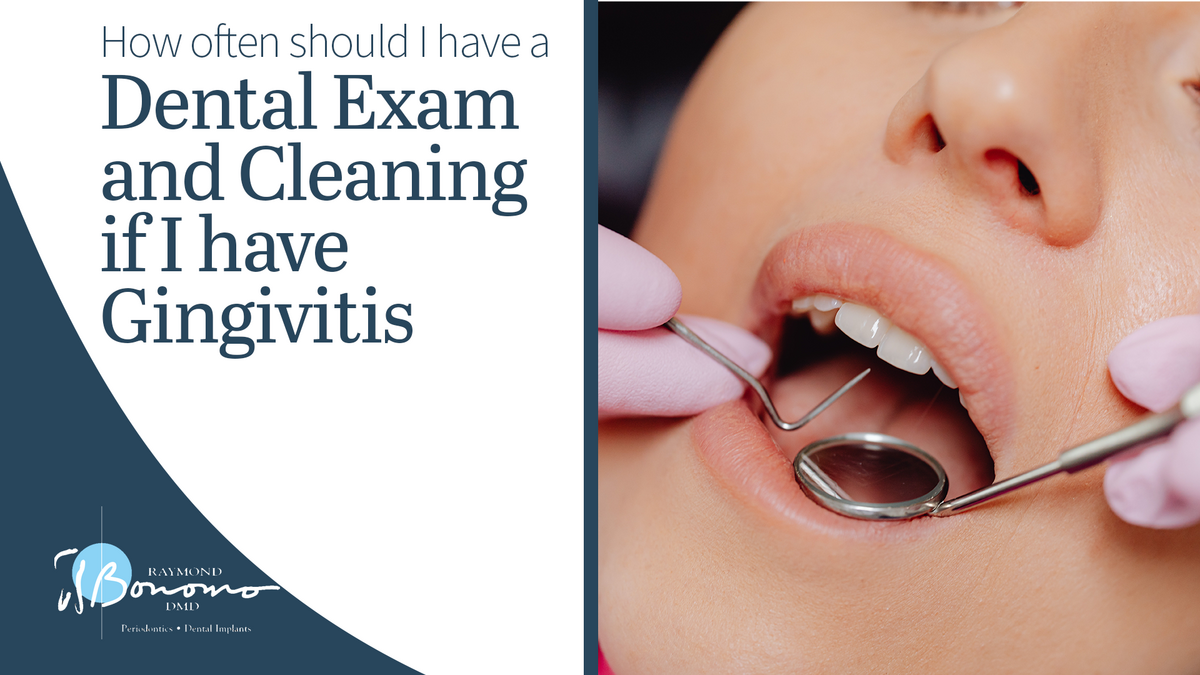How Often Should I Have a Dental Exam and Cleaning if I Have Gingivitis?

The regularity of appointments is decided by a number of factors, including the severity of your gingivitis, your risk level, your doctor's preferences, and other contributing factors.
If you are not sure how often you should schedule a dental exam if you have gingivitis, then this guide is for you. This blog post will tell you what gingivitis is, what happens if you don't treat gingivitis, and how often you should have dental exams if you have been diagnosed with gingivitis.
What is Gingivitis?
Gingivitis is a mild form of gum disease that affects the gums and tissues surrounding the teeth. It is caused by the buildup of plaque on the teeth, which if left untreated can lead to the development of periodontal disease - a more serious form of gum disease.
Symptoms of gingivitis include red, inflamed, and swollen gums, bleeding while brushing or flossing, bad breath, and receding gums. If left untreated, gingivitis can progress to periodontal disease, where the gums pull away from the teeth, creating pockets that trap harmful bacteria. This can lead to bone loss, tooth decay, tooth loss, and other serious dental and health issues such as heart disease and bone loss.
Several risk factors increase the chances of developing gingivitis, including poor oral hygiene, smoking, diabetes, hormonal changes, certain medications, and genetic predisposition. To prevent and treat gingivitis, regular dental exams and cleanings, good oral hygiene practices, a healthy lifestyle, and early detection and treatment are essential.
What Happens If You Don’t Treat Your Gingivitis?
The first stage of gum disease, gingivitis, causes red, swollen, and bleeding gums. If you don't treat it, it can progress to periodontitis, where the gums pull away from the teeth and create pockets that trap harmful bacteria. As time goes on, the bacteria can cause severe inflammation and destruction of the bone that supports the teeth. This can lead to tooth loss, which not only affects your smile but also your ability to eat and speak properly.
Moreover, more research is uncovering the link between gum disease and various health conditions. Gum disease can increase the risk of heart disease, respiratory problems, and other health issues.
That's why it's crucial to schedule regular dental visits to prevent gum disease from progressing. Your dentist can detect the early signs of gum disease and provide appropriate treatment to prevent further damage. Your dentist may recommend a deep cleaning, scaling, or root planing to remove the plaque and tartar buildup.
By maintaining good oral hygiene habits and seeking dental care promptly, you can prevent gingivitis from developing into periodontal disease and protect your oral and overall health. Don't let advancing gum disease risk expensive and complex dental procedures or exacerbate more significant health conditions; consult your dentist today.
How Often Should I Have a Dental Exam If I Have Gingivitis?
If you have gingivitis, it's important to schedule regular dental exams to prevent the disease from progressing and causing irreversible damage to your teeth and gums. The recommended frequency for dental exams typically varies between three and six months, depending on the stage of gum disease and oral health issues.
For individuals with gingivitis, a dental exam every three to four months is recommended to monitor the progression of the disease and to detect any signs of decay or other dental issues. During a dental exam, diagnostic X-rays may be taken to detect any bone loss or other signs of gum disease. Your dentist may also perform an oral cancer screening to detect any abnormalities.
Regular dental exams are crucial because some dental issues may not cause any pain or symptoms until they have advanced, such as gum disease or tooth decay. Through routine dental exams, your dentist can detect the early signs of these issues and provide appropriate treatment to prevent further damage.
Treatment for Gum Disease at Bonomo Periodontics
At Bonomo Periodontics, we offer a range of treatment options for gum disease, aimed at helping you reclaim your oral health.
We are proud to offer a variety of treatment options and we will work with you to find the best course of treatment for you. One of our most popular treatment options is the teeth-in-a-day procedure where patients get full dental implant replacements in just one day.
If you have been referred to us or are curious about how periodontal care can help you reclaim your smile and oral health, then you can click here to schedule an appointment now!
For more oral health care tips, follow Bonomo Periodontics on Facebook.
Happy with the difference Bonomo Periodontics has made in your life? Leave us a five-star review here!

